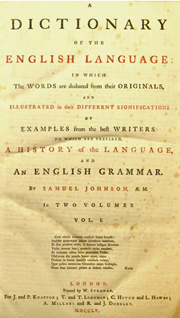On April 15, 1755, London newspapers announced the publication of Johnson’s Dictionary: “This day is published—A Dictionary of the English Language: in which the words are deduced from their originals and illustrated in their different significations by examples from the best writers. To which are prefixed A History of the Language, and a Grammar. By Samuel Johnson, A.M.” (Reddick, 1990, p. 81)

The initial critical reviews were almost unanimously rhapsodic. Marquis Nicolini, the President of the Italian Academy, effused that the Dictionary was to be “a perpetual Monument of Fame to the Author, an Honour to his own Country in particular, and a general Benefit to the Republic of Letters throughout all of Europe.” (Reddick, 1990, p. 83). A few months later, a more probing, ambivalent evaluation came from Adam Smith, who criticized its insufficient treatment of grammar and lack of encyclopedia-style essays. Despite the generally favorable reception, the Dictionary, printed in two massive folio volumes, did not sell well. At £4.10s, it was too expensive for most readers, never mind terribly unwieldy. The savvy publishers began working on an abridged version almost immediately and demand for this version remained steady for a century.
Of course, Johnson did not reap any profit from the sales. The Dictionary was the property of his publishers and the payment he received from the commission barely stretched the nine years. In fact, Johnson was arrested for debt in March of 1756, less than a year after the Dictionary was released. Though his finances waned, his reputation did not diminish in the years following the Dictionary’s publication; he was finally able to ease the burden of poverty that had weighed on him throughout his lifetime in London when in 1762 George III granted him a pension of £300 a year.
Navigate: Don't Judge A Book By Its Cover: An Introduction / The Early Life of Samuel Johnson / The Dictionary in a Sociocultural Context / Nine Years in the Making / The Dictionary Hits the Shelves: Critical and Public Reception / Traces of the Author and his Time / Conclusion: The Legacy of a Book / *Bibliography*
